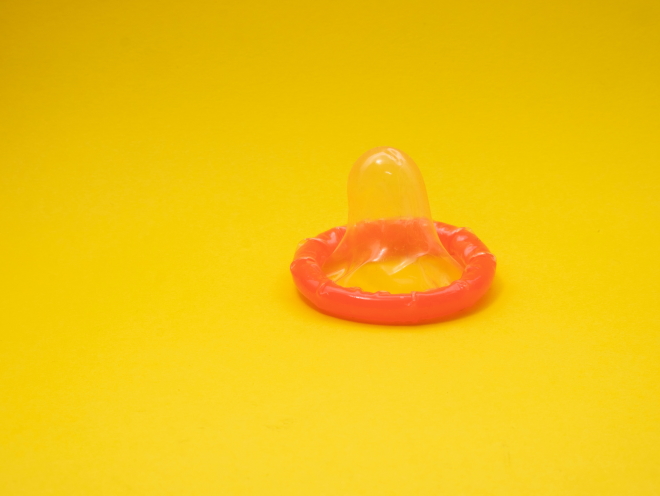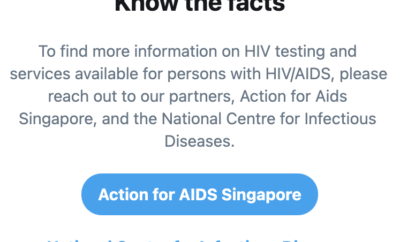
The Gen XY Lifestyle
Demystifying 8 Untruths About Living with HIV
Dr. Julian Ng, Chief Medical Office of DTAP Clinic Singapore, Malaysia & Vietnam shares 8 myths about living with HIV.
Myth 1: HIV can be transmitted through casual contact
In the clinic, I have often encountered distressed patients with questions about whether HIV can be transmitted through casual contact, such as sharing food and drinks, kissing, sharing a toilet, holding hands or even nipple play at a massage. These cannot transmit HIV. The risk of transmission for even brief oral sex is not zero, but extremely low.
HIV is mostly transmitted via sexual contact, penetrative sex.
The highest risk of transmitting HIV is via unprotected anal sex, followed by unprotected vaginal sex. Within unprotected anal sex, if you are the receptive partner of anal sex, your risk is higher than that of the insertive partner.
Myth 2: I don’t have any symptoms so I cannot be infected with HIV
In my practice, I have noticed that some people think that they cannot be infected with HIV if there are no symptoms, often after consulting “Dr Google” for the symptoms.
It is important to note that majority of people infected with HIV do not have any symptoms, and the only way to know for sure is to do the HIV test. Generally, there are two forms of HIV tests currently; the HIV third generation test which detects antibodies, and has a window period of roughly about three months, and the HRV fourth generation test which detects both antigen and antibody, and the window is generally about 28 days. This is why your doctor needs to know when your last risky sexual contact was before advising you on the tests.
On the flip side, there are also those who read on Google and found a list of symptoms which may suggest that they have been infected by HIV. In reality, there is no single symptom that can tell you whether you have been infected with HIV or not.
Some of the symptoms may have been documented for some people who have been infected with HIV, especially after a couple of weeks to a month, during the acute phase of the infection when they may have some low grade fever, and flu like symptoms. These are no different from symptoms experienced with normal influenza, cold or even COVID-19.
Having said that, if a person has been infected with HIV and does not get diagnosed early, this may allow HIV to progress to the stage of AIDS. AIDS is the other end of HIV infection where the HIV infection has been ongoing for a long period of time without treatment or control.
Myth 3: Life is over if I am tested positive for HIV
This is something that I come across quite frequently, especially when breaking the bad news to someone who has been tested positive for HIV. Very often, the first thing that they say to me is that his or her life is over. This is a misconception, and not true. Life is not over if you have been tested positive for HIV, as highly effective medications are available these days with little or minimal side effects. This means that someone living with HIV can effectively lead a normal, healthy, productive life. With the new generation of HIV medications available for treatment, the life span of a person living with HIV these days is on par with someone who is not infected with HIV.
This misconception arises from the early days of HIV infections. When we first knew about HIV infections right back in the 80s, and possibly in the 90s as well, a cocktail of different medications can help for a short period of time. Many of these patients did not have a normal life span because at that point in time the drugs had a lot of side effects. As a result, many of them dropped off from the treatment program, leaving the HIV infection uncontrolled, and leading to a premature demise.
It is important to remember that if you or you know of someone who has been diagnosed with HIV, be aware that life is not over. In fact, it is far from it. You can lead a normal, healthy and productive life, even if you are tested positive for HIV. Most important of all, get diagnosed early to get treatment early and to continue with the treatment.
If you have been recently diagnosed with HIV, the earlier you start effective treatment, the earlier your immune system can recover and the less impact it has on your immune system. In most cases you can achieve undetectable levels which is roughly defined as less than 40 copies of the HIV virus in your body within six months after starting on effect effective treatment.
Myth 4: I can engage in condom-less sex if I or my partner have undetectable HIV viral load
Yes, effectively there is no risk of HIV if your partner has undetectable viral loads. Very recently, in 2019, a novel phrase of U equals U (U=U) arose. A study was published on MSN sero-discordant couples (a couple in which one party is living with HIV, the other party does not have HIV, and they engage in condom-less sexual contact throughout the duration of the study) and it was found that there was no HIV infection in the HIV negative partner that was attributed to the partner that was living with HIV when their viral load was undetectable. In this particular study, 972 gay couples were involved and a total of 76,088 condom-less anal sex encounters were documented. None of the HIV negative partners were infected with HIV when their partner has undetectable viral load, hence the phrase U equals U (Undetectable is equal / equivalent to untransmissible)
However, you can still transmit other STIs or be infected with other STIs if you or your partner engaged in condom-less sex. We encourage consistent condom use to reduce the risk of being infected with STI.

Myth 5: EVERYONE will know that if I have been tested positive for HIV
This is another major concern of many patients here in Singapore, especially in view of the Singhealth HIV database leak.
In Singapore, doctors have legal responsibility to inform MOH of those tested positive for HIV, under the infectious disease act. It is not used for shaming, exposing anyone or broadcasting to those who need not know. MOH uses this data for contact tracing purpose to reduce the spread of HIV infections in the community, as most of the time, HIV infections are asymptomatic. Hence, a sexual partner who may have transmitted HIV to someone or have been transmitted by someone may not be aware and continues to spread the infection to other partners as well. Patients can be assured that the information will not be divulged to those who do not need to know.
As to what is considered as ‘need to know”, your employer, for example, need not know unless you work in a high risk environment such as a doctor or a scrub nurse in operating theatre. Your family members need not be informed as casual contact does not transmit HIV.
Having said that, I do encourage my patients who have been tested positive for HIV to at least let some, if not all of their family members know. The reason is that it is a long journey and you are going to need a lot of emotional and psychological support, and the best people to give you that support is your family and your friends. So if you think that you can bring someone in confidence or write about your status, please let the person know about your status already because he or she will be able to support you through your journey. Of course, this is a personal decision, and up to each individual to decide for themselves whether they want to divulge.
So one thing to note is that in theory, employers are not allowed to actually ask about your HIV status unless there is a need to do so. In theory, you don’t have to divulge your status to your employers. All these I’ve actually mentioned, the only thing that you need to be aware of as some of you may not actually be aware of and this is something that I think the public needs to know is that other than the infectious diseases act.
However, if someone is aware of that he or she is living with HIV, it is a legal requirement to inform your sexual partner or partners. Again, it is to safeguard the public health, against people who I am sure many of you have come across stories of people who are HIV positive and knowingly and maliciously infect sexual partners for their own reasons. That is why the law is there to protect you in that sense. This law is not used as a means of discrimination but more of an effort to protect public health.
If you are the sexual partner who is HIV negative, you may like to have the option to decide whether you want to have sexual contact with a person living with HIV. This is a position that should be discussed between the two partners, between two consenting adults; and this is just mutual respect for each other.
Myth 6: I heard that side-effects of the HIV medications are so terrible that I will not be able to work
With the very old generations of the HIV medications back in the 80s and 90s, that is true. However, current generation of HIV medications are highly effective, with very minimal side effects. Some of the side effects that were associated with the older medications just a decade or so ago were things such as nerve issues, fat changes, high cholesterol problems and osteoporosis. With many of the current medications available, these side effects are minimal, mild, transient or non-existent. Most common side effects are fatigue, nausea, loss of appetite.
In most cases these common side effects last for about one to two weeks or up to a month. For some of the HIV medications, there are some rare side effects such as vivid dreams or hallucinations and they are usually transient for a majority of them and can last up to a month. It can be quite scary for those who take this particular HIV medication and therefore usually I will let them know before they start on this particular HIV medication.
For the majority of people living with HIV on current generation of medications, they do not suffer from side effects, and can go about their usual routine, exercise, work, and spend time with their family and loved ones.
Life goes on.
Myth 7: If I have undetectable HIV viral load, it means that I can stop taking the medication
This is not an unusual situation, even amongst patients who have blood pressure problems. When we bring their blood pressure back down to normal with medications, they think that their blood pressure problem is solved, but that is not true. The main reason why their blood pressure is normalised is because they are actually on medication.
Similarly, HIV at this point in time is not curable, but it is definitely controllable and treatable. We can suppress the HIV viral load to undetectable levels with the current generation of medications, but it also means that you need to be consistent with taking the medication, and continue taking it until there comes a time where someone actually invents a medication or vaccine that can cure or prevent HIV.
And again, very importantly I want to stress that the medications will suppress the viral load to such low levels that it would minimise the impact of HIV virus on your immune system, and this means that you will be able to live a normal and productive life.
Myth 8: I should not/cannot get the COVID-19 vaccine as I’m living with HIV
This is not necessarily true.
You can take the COVID-19 vaccine as long as your CT score count is greater than 200 and your viral load is suppressed.
You are actually encouraged to go for the COVID-19 vaccine, as you are at a higher risk of single serious complications if you do become infected with COVID-19.
I would highly encourage persons living with HIV to consult the doctor who has been following them up and to do a recent CT score count, as well as a viral load. If your CT score count and your viral load is good, you should go for the vaccine. During the registration process as well as during the screening questions, they will get more details from you. My suggestion is for you to bring along your latest CT score count results and your viral load results to the vaccination centre and you can show to the doctor who will be assessing you on your suitability for COVID-19 vaccine.
About Dr Julian Ng
Dr Julian Ng graduated from the University of Sydney with the Bachelor of Medicine and Bachelor of Surgery. Prior to his medical degree, he had obtained Masters of Science in Microbiology in the National University of Singapore. He has worked in Sydney in areas of Respiratory Medicine, Vascular Surgery, Rehabilitation Medicine and Adult Emergency Medicine.
About DTAP
Established in 2005, DTAP (Dr. Tan & Partners) clinics, a pioneer of the GP plus, or “General Practice with Special Interest” model in Singapore, provides holistic and comprehensive medical care for everyone. We provide basic GP services with a key focus in HIV & STD testing and management, Men’s Health (Andrology), Women’s Health, Aesthetics, and Chronic Disease Management services. DTAP clinics are located in Singapore and Malaysia, and DTAP Express is the first clinic in Singapore with express self-testing kits for STD. “DTAP to Home” is an extension of DTAP Teleconsult and DTAP Delivery for medications, supplements and health aid services. S Aesthetics clinic is a sister company of DTAP clinics.
Photo by Priscilla Du Preez on Unsplash and by Reproductive Health Supplies Coalition on Unsplash









